
The many faces of Psy in Gangnam Style. You can buy these as stickers. Collect them all!
First of all, here’s the video, if you haven’t seen it already. If you are sick of the song, you can also watch it without music.
Secondly, in my third-most-ever-favorited comment on metafilter, I talked about Psy’s Gangnam Style and race in America:
Gangnam Style isn’t the first viral smash Kpop song, or even the first viral smash Kpop song that sort-of sounds like LMFAO and was produced by Teddy Park of YG Entertainment (who has been working with the artists to adapt the same ultra-mega-popular song into a huge smash hit every six months like clockwork – here’s 2NE1’s I Am The Best and Big Bang’s Fantastic Baby, if you missed them the first time).
But of those three acts – each of which has already gotten a lot of U.S. attention, i.e. Pitchfork wrote about 2NE1, Will.i.am worked with them, MTV Iggy called them the best band in the world; Big Bang were crowned Best Worldwide Act at the MTV Europe VMAs and have been written up in US and European business magazines – Psy, a previous unknown (to the US), is the act the entire Western celebrity world has decided to back.
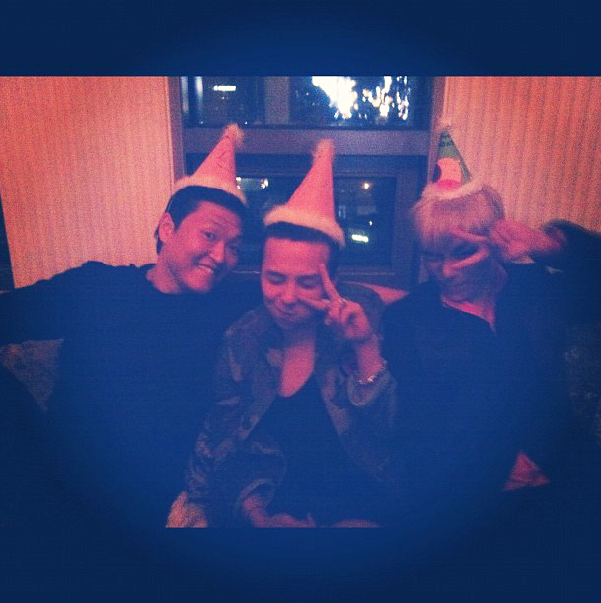
Psy and Bigbang’s G-Dragon, hanging out.
On metafilter, I speculated that while not precisely a conspiracy, the choice to throw US media and celebrity weight behind Psy and not another act was a tactical move:
Compared to those other songs, “Gangnam Style” is a lot more relatable to the average person – it’s a song about acting like you are rich, whether or not that’s really true, rather than a song about being actually rich and famous (although Psy is both of those things, in South Korea).
More than that, it’s relatable for the average American, who can comfortably put Psy in a couple pre-existing mental boxes: hilarious “not attractive” guys partying hard and getting the girl; funny Asian guys; funny viral videos built around dead-serious funny performances in public places; even subtle social commentary. Bringing Psy over here broadens people’s ideas of a viral pop song a little bit, since it’s in another language, but not too much, since, after all, Psy is singing about how he isn’t the
rich person he dreams of beingtypical celebrity guy.

Psy x Justin Bieber. They share a manager in the US, Scooter Braun.
To expand on that a bit more – and please forgive me for retreading already well-tread ground – Psy’s Gangnam Style video isn’t just funny in ways that Americans recognize, e.g. the hot tub scene borrowed from Austin Powers. It’s also implicitly critical of “all flash no substance” celebrations of celebrity vanity/megalomania.
For instance, here are videos by B.A.P., f(x), Jo Kwon, Tasty, Girls Generation and After School proclaiming their own greatness – although this last one is a Japanese single released by a South Korean group, not properly a Kpop song. It is, however, a great example of the kind of stadium-ready pop South Korea has been making since the World Cup last summer, and again this summer in celebration of the Olympics – for which Psy has, natch, written the official theme song.

Psy performing at one of his famously crazy concerts, underneath (cartoon) images of himself.
The difference between those groups and Psy isn’t precisely hubris as Gangnam Style is, after translation into English, already plenty boastful. Rather, it’s a comment on artificiality: Psy’s video is set in the real world – albeit one full of celebrity cameos and action-movie stunt acting – while other groups save money by filming in constructed worlds made up of empty mansions, empty clubs and empty rooms; or else in the “real” Kpop world of stage lights and dressing rooms. And that’s if there is any nod to reality at all. In its purest form, Kpop features locations that aren’t just abstract and prone to disorienting lighting, but subject to no other logic but the logic of capitalist consumption – a predilection that’s been noted on this blog previously.
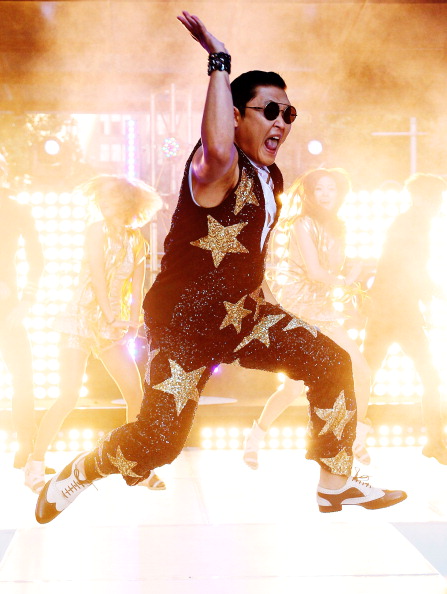
Psy live in Australia, in a concert still that looks like an action-movie poster.
Of course, there’s a lot of self-awareness in the artificiality of these videos… in addition to being generally more economical, they sometimes also double, Lady Gaga-like, as commentary on their own artificiality (one, two, three).

Images of Psy proliferating everywhere on the latest episode of South Park.
But to return to the topic at hand: The good-looking teen and twenties celebrities who populate Kpop music videos belong in their world, being in part “constructions” themselves – that is, the groups are definitely constructed; the personas are partially constructed; and the faces and bodies are meticulously constructed through a combination of professional makeup, professionally-guided diet and exercise, and plastic surgery. Psy, although also a nominal member of this set – and actually hailing from the swank Seoul district of Gangnam, Korea’s plastic surgery capital – does not look like he belongs with them, and therefore has to fight to be recognized as belonging to a glittering world in which only handsome people exist.
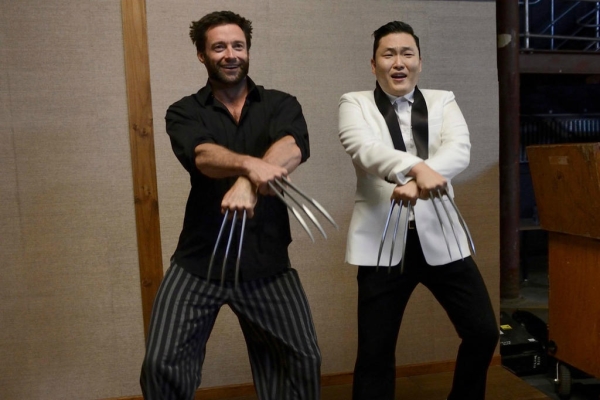
Speaking of handsome people: Psy with Hugh Jackman
Despite what the Atlantic would have you believe, however, Psy is far from alone in his satirical take-down-from-within-the-industry. Even apart from direct critiques – of superficiality, of sexist double standards, of government censorship, of materialism and gender roles – Gangnam Style actually comes in the middle of a move toward broadening the appeal of Kpop by setting it in real places. Like This and Ice, for instance, are two of this summer’s other attempts, proceeding Psy’s, at LMFAO-style outdoor flashmob videos.
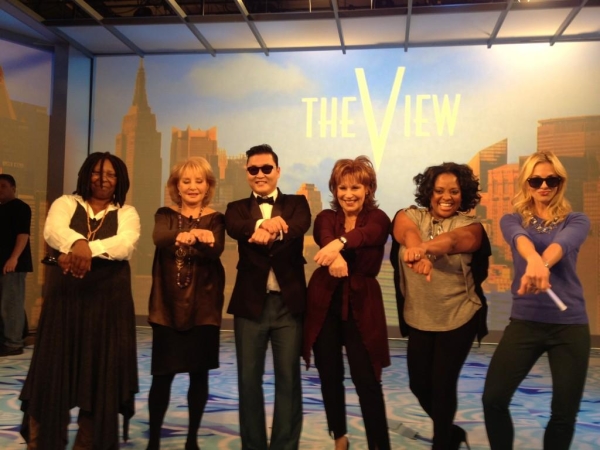
Psy leading an impromptu(?) flashmob on The View
With that said, there’s still plenty of artifice to go around. On metafilter I concluded that trying to viral-market any of the more obviously constructed groups in the US
would require a long explanation about what Kpop is and why those artists “really are” famous. This would require the U.S. public to buy into a world where the U.S. is not the center of all pop music production “that matters”. So yeah, I think there is quite a bit of commercial calculation behind the media push of [Gangnam Style]. Which doesn’t mean it’s not a great song worthy of being spread, just that there is a reason it was
thingthis song, and not some other one.
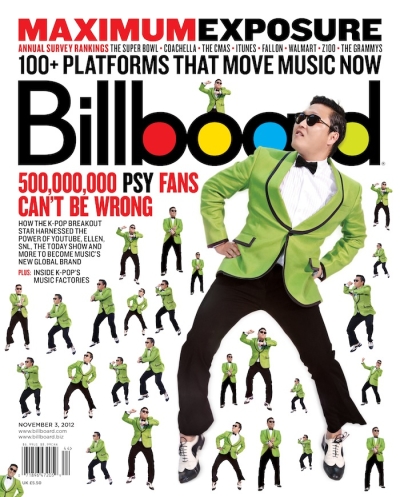
Psy presiding over many images of himself on the latest issue of Billboard
Do I still think this way about Psy’s smash hit? Yes and no. Here’s Ask a Korean, probably the first place you should go for answers to these kinds of questions, on the reasons for the song’s success overseas:
First, Korean pop music has been laying a solid groundwork for PSY to succeed. It is true that, thus far, efforts by Korea’s pop stars to break into the U.S. market resulted in a flop. Top stars like Wonder Girls, Girls’ Generation and 2NE1 never made a dent on America’s public consciousness. Nevertheless, the groundwork that these groups laid remains important. Because Korean pop music at least got on the radar screen of the insider players of American media market, PSY’s music was easily accepted by those insiders.
This is a crucial point that separates Korean pop music and pop music from other, non-Anglophonic countries. Through repeated contacts with American media, Korean pop music had a ready audience among American media insiders.
Check the original post for more, including a great graphic of a T-Pain-centric view of the universe.
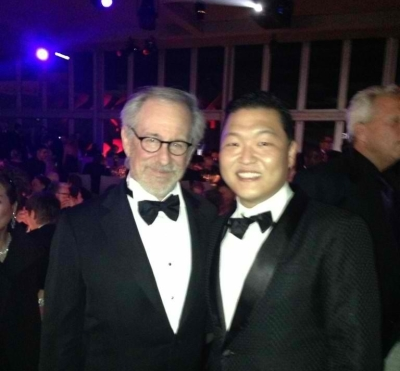
Psy with ultimate Hollywood insider Steven Spielberg.
Though initially on the “why this song and not another?” train, I’ve since rethought my position. Maybe it’s true that Gangnam Style doesn’t threaten a US-centric view of the US’s place in the center of world the way that another, more nakedly imperial song would. On the other hand, this song is also popular in Istanbul!
This has been on my mind since I was Turkey recently. Istanbul, at the crossroads of Europe and Asia, has pockets of hyper-capitalism inside a generally conservative culture – kind of similar to Korea? In any case, a gazillion Turkish parodies exist for Gangnam Style, including this one with found footage of old men dancing at weddings. “Uncool” guys acting “crazy” for the benefit of young, conventionally attractive women, whom they would like to impress, is a near-universal phenomenon, it would seem.

Another artist who is popular in Istanbul, Sardor Rahimhon. Lacking Psy’s discipline, he is occasionally photographed out of uniform.
And everyone loves a silly dance craze. This is anecdote, but it’s not just that this song is playing at cafes; from our hotel room in the old city, we saw a guy doing the horse-dance down the street…
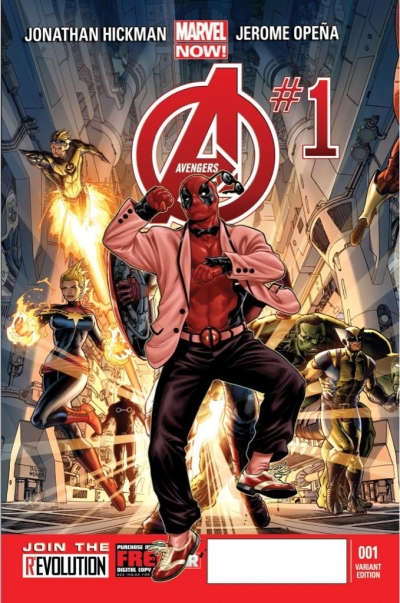
Deadpool doing the Gangnam Style horse dance on the latest issue of The Avengers.
I have kind of come around on Gangnam Style, then, and now think the silly – and yet instantly recognizable – dance on top of the ridiculous – and yet instantly recognizable – LMFAO-style beat is the main thing, along with the boost from American media/celebs who rightly saw the viral potential of the video and performer.
In the final analysis, then, the viral power of Gangnam Style comes from its being instantly recognized, widely liked, and easily reproduced. But where is Psy getting that cool-dorky look from anyway? Technically, from trot: Korea’s traditional pop music form which is currently experiencing something of a revival. Psy only looks trot, though: his music is pure 00s bombastic stadium rock, mixed to already sound like it is being played over loudspeakers at a large sporting event.
But what about that trot beat, eh? Another thing I will throw out for your consideration – if only because I haven’t seen it mentioned elsewhere – is Serbia’s entry in the 2010 Eurovision contest. Op, op, op! Ovo je Balkans! For more on this connection, read on…
Frank Kogan – Koganbot – has been writing about what he calls the Austral-Romanian Empire, a pop music spectrum that ranges from Tu Es Foutu and We No Speak Americano in the East (Australia/Oceania) to D-D-Down and Mr. Saxobeat in the West (Romania). To his list of Kpop singles that incorporate sounds from across the (Eastern) world music spectrum, I’d add Musiche by Crazyno (pronounced Cray-ZEE-no)… a guy dressed up like a Balkan entertainer/a trot performer/Psy…
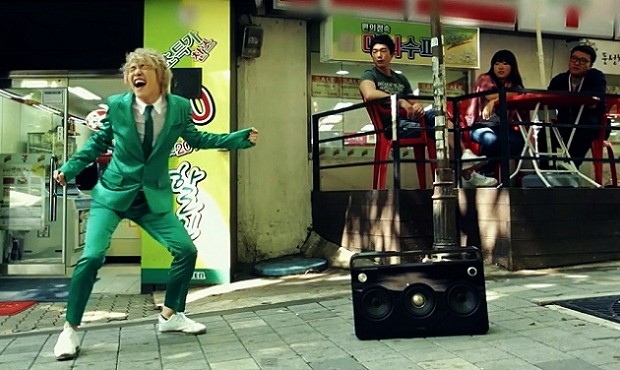
Crazyno is from Australia! Perfect! But is he willing to wear that suit every day for the rest of his life?
The influence isn’t one-way, of course. Kazakhstan has their own Kpop-style boyband, for instance: Orda, also here. And meanwhile, a Kpop group that’s always had a strong European following is TVXQ, who right now have my current favorite take on the LMFAO Party Rock beat. Even knowing about this connection, however, it took going to Istanbul for me to notice exactly how much like typical Eastern European pop the video for Tallentalegra – by former TVXQ member Xia Junsu – is. You know the kind of thing I’m talking about, right? It’s a look that’s so well known (on women) that it was parodied by Hilary Duff in Iraq War black-comedy War, Inc.

Last celebrity cameo! Psy with Golden Girl Betty White
So there’s that. In other examples of trend-chasing, meanwhile, there’s the micro-trend of British-chart-sounding singles at YG Entertainment (Psy’s company): Dancing on My Own, I Love You, Don’t Hate Me, CraYon. For comparison/contrast, here is UK pop group Girls Aloud.
No corner of the globe is safe, however! If you want to find some Spanish guitar-y singles, you can find them as well: Wow, I Wish. Is Block B going for a similar audience, or a US audience, or in fact a worldwide audience with their Pirates of the Carribbean-sounding single Nallila Mambo (which you absolutely must watch)?
All of this is without even getting into Kpop’s first successful overseas expansion…to Japan. As my friend Sabina said, this is where the Italo producers went after Italodisco died in Europe. 4minute have multiple Japanese singles in this style. When people talk about Kpop, “Gee” and the Norwegian wave, they are generally talking a collaboration between Kpop songwriters and European dance producers. Many words have already been spilled on this particular connection, so I won’t spill any more – check Thomas Troelson’s wikipedia page for a general idea.
So it’s no surprise that Turkey is ready to embrace this pop amalgam, existing, already, at the crossroads of pop. Pop music television in Istanbul is a mishmash: they got stuff from the US and the UK, stuff from Eastern Europe, stuff from Russia, stuff from India…

Okay okay, this is the last celebrity cameo. Psy with Ban Ki Moon, current Secretary-General of the United Nations
Someone called the Kpop style the style of the mashup, but I don’t think that’s quite right. I think there are some unique things that no one else really does, or at least that are not a part of mainstream pop elsewhere. For example, I think that Kpop produced for an older domestic audience follows slightly different trends and is slightly less bombastic – or at least is bombastic in a more complex slash tortured slash melodramatic slash tragic way. But as this post is already a bit long, perhaps I’ll talk about that next time.
To bring this back to Psy, the market is nothing if not adaptable. It didn’t take underground-rapper-with-pop-ambitions E.via very long, for instance, to come out with a response song and video. She’s even using a cartoon image of herself to promote!
And speaking of cartoons, you have been wondering about that Deadpool-doing-the-horse-dance Avengers cover, right? Wonder no more: Deadpool VS Gangnam Style.
This ended up being a bit messy as I was trying to slot a lot of things in. I think I kind of forgot to do any analysis. >_> Anyway, some questions popped into my mind as I was writing this:
1. Considering Psy has a schtick that he adheres to fairly closely, what can you really say about racial boundaries being broken down by this song? Psy-the-performer is a person, but also a cartoon character.
2. “Psy” being such a constructed persona makes Psy’s satirical takedown of “constructed” beauty all the more delicious… but then, as much as it’s easy to overlook distinctions like weird-constructed-persona VS hot-constructed-persona from where I am sitting over here behind my computer screen, lookism and associated rampant materialism do seem to be a real problems in at least certain parts of Seoul, which are then reified and magnified by the Seoul-based pop industry… Kind of similar to LA – or actually West Hollywood – and the movie industry, then.
Truly, the most irritating song since “Macarena.”
Do you like any pop, Charles? (Abba? Carpenters?) Or not your thing?
Yes, I love Abba and I can listen to a few of the Carpenters’ best songs. Madonna and Cyndi Lauper’s first couple of albums. And I really love girl singers from the 50s. Pop music is starting to sound like the product of software at this point, though (but most genres are dead). There are a few songs here and there that transcend the crud, mostly by accident. Usually, it’ll be some trance-inducing minimalist quality that’ll grab me on a modern not-really-R&B pop tune. (Abba, contrariwise, is really brilliant.)
And, subdee, isn’t just the nature of capitalism to appropriate its negation and sell that? That’s why an ironic disposition to capital, using a perverse appreciation of its excesses against it, working from the inside, doesn’t work. It just is being a capitalist.
put an ‘it’ before the first ‘just’
Ah, okay; it’s a “kid’s these days” argument. Fair enough!
(I have no particular feelings one way or another about Gangnam style, though my son loves it.)
Well, I’m not so sure, the pop music before I was a kid sounds a lot better to me than when I was a kid. But, before you try this one, I’m not a fetishist for the past, either. It’s just that sometimes, say in the case of Blues, there was a much better period than what we have now, e.g. Gary Clark. Gospel is shit these days, just as it was in the 80s (others can argue whether the 80s or now is a better period for the genre). And don’t get me started on the difference between pop country of the 60s and the pop country of now — there is no comparison. I think this has a lot to do with commodification, but it also has to do with the fact that most genres are fairly constricted, and have said about all they have to say. Now it’s mostly reproduction and smoothing out the rough spots that used to be individuality.
I don’t think “it’s a product of software” should count against pop music since it’s just like… moving the production of artificial sounds from the stage (amps, effects boxes, distortion pedals) to the studio. I mean, out-of-the-box music is not very interesting, but that’s true whether it was made on a computer or on a three-chord guitar. Having the computer just makes it easier to make technically sound music straight out of the box.
I also like the RnB charts more than the rest of the US pop music charts right now, though.
I don’t think Gangnam Style is subversive at all. And I don’t think Psy thinks it is, either! Someone asked him this question on reddit and his reply was that it’s “just FUN”.
But I also don’t think that means that songs produced within capitalism can’t be used to critique other things besides capitalism. None of the other “critiques from within the industry” are critiques of capitalism, per se. They are mostly critiques of gender roles. Can those critiques be made by good-looking idols with material wealth? Sure, why not?
Anyway I think Gangnam-Style-the-song is okay, but gets old. The video is the good thing about it… also Psy’s voice. He has a great voice.
Lots of other Kpop songs that I kind of expected to get old in the same way – like maybe I was being tricked by the bells and whistles production and disorienting music videos and pretty faces – still haven’t. The beats are interesting and there are a lot of ideas in the songs. I think so, anyway. Some of them have like five different melodies!
I’d agree that it’s in the nature of pop genre to get played out — or at least to get better and worse over time. And I’d agree that gospel has had serious problems for decades. Contemporary country is also a mess. On the other hand, R&B in the 2000s was in my view definitely better than R&B in the 80s or 90s. I think it’s probably not quite as good now as then…but I think Ke$ha is pretty great, for example. Definitely looking forward to her new album…and to Robyn’s.
Pop’s always about commodification. And there are new genre’s now (electropop, rap) that are really important to pop and haven’t actually been around that long, relatively. I think there’s good and bad in pop music now as ever. Probably worse than sometimes and better than others, but certainly not the worst it’s been even in my lifetime, I don’t think.
Forgot this pop song that might count as genuinely subversive: Can I kiss you, baby girl? The non-radical-ness of the girls-can-love-girls theme is what’s radical about it, from my my perspective. Music video probably modeled after an MV by Cher Lloyd.
On the other hand, if you want to see the process of capitalism co-opting those who protest against it in action, search BAP’s singles (Warrior –> Power –> No Mercy –> Crash –> Stop It). It’s kinda startling how totally they transformed, in about 10 months, from Linkin Park Admirers to a cutie-boy band.
Pingback: Recommended Reading: November 2nd, 2012 | Idolminded
i’m only superficially cognizant of most of the micro-trends and producer-artist pairs that you go into. inside baseball? mixed metaphors? maybe my status as a white american fan is a flimsy excuse to not think about the moving and shaking behind the music i’m allowing myself to enjoy for it’s own sake for once?
i’m ambivalent toward PSY and Gangnam personally, though what pulse i’ve felt from the generally evangelical american K-pop fandom is that we’re glad that somebody, ANYBODY has finally made a blip. that’s cool, i guess. there are other non-boring songs i personally would have picked to do it (Wondergirls’ “be my baby” i mean come ON).
i’m less cranky about boring ultra-calculated drivel overshadowing sparkly great wonderful pop tunes than before i had bigger things to fret about, and i don’t begrudge mr PSY his moment in the sun. but i do think this fixation of cracking the American market when k-pop is a globally appreciated and successful, like America is the music market that REALLY matters, is a tad quixotic.
er… that’s an oversimplification. obviously there’s a lot of money to be made in the american market.
as an earworm, gangnam style’s powers are stunning to behold, though.
inside baseball? mixed metaphors?
I think I got a bit carried away. ^^ The industry stuff is what I, personally, like to follow as a fan… The fact that the whole industry is based in one place, there are a limited number if major players, it’s in another language, “the charts” actually matter, and everything is on youtube are all plusses for me, because it makes it easier to follow.
Also the fact that I was a student again this year- and not just a student but a MASTERS STUDENT in THE UK – made it easier to follow. You don’t even want to know how much free time I had and how much was spent on this. (Could have been worse, I could have been watching the variety shows. For a while I was watching the variety shows…)
Anyway, I agree with pretty much everything you said :D
I’m glad it was Psy that broke, because man, I’d rather listen to the EDM version of Andrew WK instead of the rest of the shite that comes from the East Asian pop music industry.
we have a blasphemer among us
“we have a blasphemer among us”
Heh. Don’t think I see western music as a standard to be held up to. “Call Me Maybe” was the nadir of music in 2012. But K-pop didn’t level up to be acceptable in the west. Western pop leveled down.
I do recall Korea having a number of MCs who could rhyme with the best of them. And while its an expat cliche to say that you liked Crying Nut, I did. But the stuff being pooed out of SM and JYP? Save my ears.
And at least it hasn’t been Japan’s otaku masturbation fodder AKB48
i liked the funny, chubby asian guy dancing, the cute girls, and the old people exploding…
…as did 99% of the internet. hence the “viral” nature of Gangnam Style.
this is not to poo-poo the rest of this article. i’m actually kind of interested in Trot. the wikipedia clip wouldn’t play for me for some reason. i’ll have to look into that. pre-rock’n’roll pop music from around the world fascinates me, hence my love of Kyu Sakamoto.
XD.
Is trot pre-rock’n’roll? I actually don’t know. I understand that it’s pretty close to enka. Trot is still popular in Korea. Lots of Kpop groups make “fusion-trot” music, or perform straight-up trot in side groups/at comedy showcases.
I don’t know that much about it, but here are some newer groups:
http://www.youtube.com/watch?v=cypljQqft9s (LPG, “hammy trot”)
http://www.youtube.com/watch?v=zsTL7Dsd47w (Lay.T, “disco trot”)
http://www.youtube.com/watch?v=52nQ9HY19-o (Shinyoo, “ballad trot”)
Here’s a pure example of the genre:
http://www.youtube.com/watch?v=YOYuKMWT8jU (Shim Soo Bong 1987)
http://www.youtube.com/watch?v=gfzCkS-jY20 (Shim Soo Bong 1990)
And here are some Kpop idols doing trot:
http://www.youtube.com/watch?v=K2CNJiAq_cY (Super Junior T)
http://www.youtube.com/watch?v=QEX4ohbljHA (Infinite)
http://www.youtube.com/watch?v=i-yM6k6mr8c (T-ara)
http://www.youtube.com/watch?v=L_HF7SsSnHE (Daesung of Big Bang)
I can’t load any of these since I’m close to using up my internet allowance, so hopefully I got the right videos! Someone who knows more about this than me, feel free to step in. To me it sounds kind of like Central European folk music + disco, e.g. like this.
I guess of the major idol groups, T-ara is the one that does the best job bringing together trot and modern production. As far as I can tell, anyway… a bunch of Super Junior songs sound a bit trot-like to me as well, like “Bonamama” for instance.
Very interesting.
The only other piece I’ve read on this was in the New Yorker , which had a contrary point to make on PSY:
Ironically, for all the money that the agencies invest in idol-making, the success of PSY, the first Korean pop star to break out in the U.S., took place largely outside the factory system. PSY is with the Y.G. agency, but he has never been idol material. His first album, “PSY from the PSYcho World!,” was condemned for “inappropriate content,” and his second, “Ssa 2,” was banned for anyone under nineteen. In 2001, he was arrested and fined for smoking pot, and, during his mandatory military service, he neglected his duties and had to serve again. He’s a Korean pop star, but he’s not K-pop, and by satirizing standard K-pop tropes in “Gangnam Style,” PSY may have subverted K-pop’s chances of making it big in the West. At the very least, that a pudgy guy with a goofy dance can succeed where the most brilliantly engineered idol groups have not suggests that cultural technology can get you only so far.
I’d recommend it as a weekend read… you can find it here.
I guess what intrigues me are the alternating opinions on how ‘industry’ going viral is… how much control have record companies and promotions been able to scrape up? Also, there’s some debate about how representative PSY is of the industry. I kind of feel that PSY is as groundbreaking for Kpop in the US as OZone’s Dragostea Din Tei was for the Romanian pop 8 years ago.
That’s a great article.
The only bones I’d pick with it would be: 1) the idea that second-tier singing is a turn-off to US audiences. Lots and lots of second-tier singers who are pop stars here, f’r instance Rihanna, Katy Perry, more than a few emo frontmen… actually I think that while live singing is generally a lot worse – a LOT worse – in Kpop, recorded singing can be very very good, maybe because the talent agencies own the recording studios and so can afford to spend more time recording, re-recording, and re-recording again, in order to get the absolute best take. It’s my understanding that US recording is quite a bit more rushed. Then again, given that groups build a following in the US by touring and performing live, not “live” on TV shows where they’ll do a couple takes and go with the best one, this could indeed be a pretty significant hurdle. PSY is known specifically for his great live shows, for instance.
And 2), that groups who run into trouble with the Korean government, like PSY, are outside Kpop. I mean, PSY *is* outside the idol system, but lots of idols also have these types of run-ins… recently, the idol system has been recruiting a lot of former underground rappers, f’r instance the guys in Block B and Phantom, and sometimes those groups court controversy. I think the boundaries of the system are expanding a bit, and it’s not quite as clear-cut as “taken in as a trainee at 12 and trained for 7 years before being allowed to debut in a group” anymore – at least not all the time.
As far as why that system works over there, besides the fact that it weeds out all the hopefuls who can’t hack the insane promotion schedules, I kind of think it’s because “talent” is subjective but “works hard” can be objectively measured. We like “talent” over here though, with hard work also often also occurring, but out of the spotlight.
There ends my uninformed opinion… that really is a good article, though. The parts about the SM Manual (“The manual, which all S.M. employees are instructed to learn, explains when to bring in foreign composers, producers, and choreographers; what chord progressions to use in what country; the precise color of eyeshadow a performer should wear in a particular country; the exact hand gestures he or she should make; and the camera angles to be used in the videos”) is particularly great, in a “holy cow!” kind of way. I also like this interview with Psy in the NYT.
@subdee thanks for the links. the wiki article said it went back to like 1938, so i just figured it was pre-rock.
i actually kind of thought of Enka based on the description in the wiki.
“And don’t get me started on the difference between pop country of the 60s and the pop country of now — there is no comparison”
I couldn’t agree more. At least Bluegrass still has its integrity. And Folk.
Bluegrass has been changed radically by Alison Krauss and her acolytes (and not for the better.) And folk music too; freak folk is a huge deal, and has radically transformed both folk music’s present and the understanding of its past.
I don’t like contemporary country either — but the bewailing of country’s loss of integrity is a longstanding genre trope, and one that doesn’t sever the 60s from today, but very much connects the two. Richard A. Peterson’s Creating Country Music: Fabricating Authenticity, is pretty definitive on that score.
Agree to disagree. I think Krauss & her band’s musicianship is close to faultless. And at least she doesn’t drench her music in the gobs of cotton candy production that the mainstream does.
I find Krauss’ production pretty gloppy. But, agree or disagree, there’s no way around the fact that her music is really different from Bill Monroe’s. So “integrity” has little to do with being true to history in an absolute sense; it’s an authenticity claim.
I wrote about Krauss here.
Pingback: Big Bang @ Prudential Center, 12/9/12